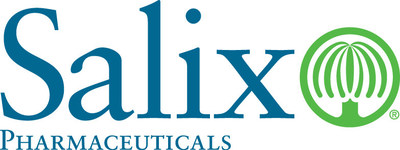New Data on Cost Impact of Treating Opioid-Induced Constipation (OIC) with FDA-Approved Medications, Including Salix's RELISTOR® Subcutaneous Injection (Methylnaltrexone Bromide), in The Emergency Department Is Published in Advances In Therapy
Bausch Health Companies (NYSE/TSX: BHC) announced a study demonstrating that FDA-approved medications for opioid-induced constipation (OIC), particularly RELISTOR®, significantly reduce hospitalization rates and costs. Research published in Advances in Therapy showed a 64% lower chance of hospitalization for OIC patients treated with OIC-Rx compared to those who were not. Furthermore, patients treated with RELISTOR had a reduction of $781 in healthcare costs per emergency department encounter. The study highlights the potential healthcare benefits and cost-effectiveness of using RELISTOR in OIC management.
- 64% decreased odds of hospitalization for patients receiving RELISTOR SC compared to those without OIC-Rx (11% vs. 26%; p<0.001).
- Patients receiving RELISTOR SC had 0.7 fewer inpatient days per ED encounter (0.3 vs. 0.9 days; p<0.001).
- $781 reduction in healthcare costs per OIC ED encounter for patients treated with RELISTOR SC ($1,603 vs. $2,384; p<0.001).
- $392 reduction in healthcare costs during the 30-day post-discharge period related to re-encounters for the RELISTOR SC group ($1,545 vs. $1,937; p<0.01).
- Study limitations included reliance on data from a hospital-based encounter database, limiting comprehensive efficacy and safety assessments.
Research Reveals Reduction in Hospitalization Rates, Length of Stay and Health Care Costs When Treating OIC with FDA-Approved Prescription Medications
LAVAL, QC, March 24, 2022 /PRNewswire/ -- Bausch Health Companies Inc. (NYSE/TSX: BHC) "Bausch Health" and its gastroenterology business, Salix Pharmaceuticals ("Salix"), one of the largest specialty pharmaceutical companies in the world committed to the prevention and treatment of gastrointestinal diseases, today announced that Advances in Therapy has published new health economic and outcome research revealing that patients who received prescription medications approved by the U.S. Food and Drug Administration (FDA) for opioid-induced constipation (OIC-Rx), including RELISTOR® subcutaneous injection (SC) (methylnaltrexone bromide), in the emergency department (ED) were less likely to be hospitalized, and when hospitalized, had a shorter length of stay than patients who did not receive an OIC-Rx in the ED. These findings highlight the potential for RELISTOR SC to provide relief for patients with OIC. In this study, the data showed OIC prescription medications "may reduce the need for lengthy and costly hospital stays and lead to important improvements in quality of patient care and outcomes."
"ED visits and hospitalizations are significantly higher for patients who are taking opioids to manage chronic pain from serious conditions like cancer and experiencing OIC," said Dr. Frank Peacock, lead author and director of Research at Baylor College of Medicine. "This research provides meaningful evidence to support the use of prescription medicines, including RELISTOR SC, in treating OIC to potentially reduce health care costs and improve patient care."
Entitled "Opioid-Induced Constipation: Cost Impact of Approved Medications in the Emergency Department," this real-world retrospective health economic and outcome research identified over 30,000 adult patients with OIC during an ED encounter from a large hospital-based encounter database (2016–2019). Patients were classified into two mutually exclusive cohorts — the OIC-Rx cohort (n=11,135) and the No OIC-Rx cohort (n=21,474) — based on whether they received an OIC-Rx in the ED. More than
After adjustment for potential confounders, the study found that patients in the OIC-Rx cohort had
Opioids are effective analgesics widely used for managing different types of pain, including cancer pain and chronic non-cancer pain. Constipation is most the common complication of opioid use that not only reduces patient quality of life but may also lead to serious medical sequelae and psychological distress. The objective of this study was to assess the efficacy of FDA-approved OIC-Rx — largely driven by RELISTOR SC (
The study findings should be interpreted in the context of certain limitations. The study was limited to clinical information available in the encounters-level database from the hospital systems that contributed to the database; thus, measures of efficacy (e.g., validated instrument scores, physician notes on symptom improvement), safety (e.g., adverse event reporting), reasons for patients receiving or not receiving OIC-Rx in the ED and information outside the encounter level (e.g., over-the-counter laxatives, outpatient management) could not be assessed.
This study was funded by Bausch Health US, LLC; RELISTOR SC is distributed in the United States by Salix Pharmaceuticals, which is a division of Bausch Health US, LLC. The study sponsor was involved in several aspects of the research, including the study design, the interpretation of data, and the production of the poster.
About RELISTOR
RELISTOR® (methylnaltrexone bromide) is an opioid antagonist. RELISTOR tablets and RELISTOR injection are indicated for the treatment of opioid-induced constipation (OIC) in adults with chronic non-cancer pain, including patients with chronic pain related to prior cancer or its treatment who do not require frequent (e.g., weekly) opioid dosage escalation.
RELISTOR injection is also indicated for the treatment of OIC in adults with advanced illness or pain caused by active cancer who require opioid dosage escalation for palliative care.
IMPORTANT SAFETY INFORMATION
- RELISTOR tablets and injection are contraindicated in patients with known or suspected mechanical gastrointestinal obstruction and patients at increased risk of recurrent obstruction, due to the potential for gastrointestinal perforation.
- Cases of gastrointestinal perforation have been reported in adult patients with opioid-induced constipation and advanced illness with conditions that may be associated with localized or diffuse reduction of structural integrity in the wall of the gastrointestinal tract (e.g., peptic ulcer disease, Ogilvie's syndrome, diverticular disease, infiltrative gastrointestinal tract malignancies or peritoneal metastases). Take into account the overall risk-benefit profile when using RELISTOR in patients with these conditions or other conditions which might result in impaired integrity of the gastrointestinal tract wall (e.g., Crohn's disease). Monitor for the development of severe, persistent, or worsening abdominal pain; discontinue RELISTOR in patients who develop this symptom.
- If severe or persistent diarrhea occurs during treatment, advise patients to discontinue therapy with RELISTOR and consult their health care provider.
- Symptoms consistent with opioid withdrawal, including hyperhidrosis, chills, diarrhea, abdominal pain, anxiety, and yawning have occurred in patients treated with RELISTOR. Patients having disruptions to the blood-brain barrier may be at increased risk for opioid withdrawal and/or reduced analgesia and should be monitored for adequacy of analgesia and symptoms of opioid withdrawal.
- Avoid concomitant use of RELISTOR with other opioid antagonists because of the potential for additive effects of opioid receptor antagonism and increased risk of opioid withdrawal.
- The use of RELISTOR during pregnancy may precipitate opioid withdrawal in a fetus due to the immature fetal blood-brain barrier and should be used during pregnancy only if the potential benefit justifies the potential risk to the fetus. Because of the potential for serious adverse reactions, including opioid withdrawal, in breastfed infants, advise women that breastfeeding is not recommended during treatment with RELISTOR. In nursing mothers, a decision should be made to discontinue nursing or discontinue the drug, taking into account the importance of the drug to the mother.
- A dosage reduction of RELISTOR tablets and RELISTOR injection is recommended in patients with moderate and severe renal impairment (creatinine clearance less than 60 mL/minute as estimated by Cockcroft-Gault). No dosage adjustment of RELISTOR tablets or RELISTOR injection is needed in patients with mild renal impairment.
- A dosage reduction of RELISTOR tablets is recommended in patients with moderate (Child-Pugh Class B) or severe (Child- Pugh Class C) hepatic impairment. No dosage adjustment of RELISTOR tablets is needed in patients with mild hepatic impairment (Child-Pugh Class A). No dosage adjustment of RELISTOR injection is needed for patients with mild or moderate hepatic impairment. In patients with severe hepatic impairment, monitor for methylnaltrexone-related adverse reactions and dose adjust per Prescribing Information as may be indicated.
- In the clinical studies, the most common adverse reactions were:
OIC in adult patients with chronic non-cancer pain - RELISTOR tablets (≥
2% of RELISTOR patients and at a greater incidence than placebo): abdominal pain (14% ), diarrhea (5% ), headache (4% ), abdominal distention (4% ), vomiting (3% ), hyperhidrosis (3% ), anxiety (2% ), muscle spasms (2% ), rhinorrhea (2% ), and chills (2% ). - RELISTOR injection (≥
1% of RELISTOR patients and at a greater incidence than placebo): abdominal pain (21% ), nausea (9% ), diarrhea (6% ), hyperhidrosis (6% ), hot flush (3% ), tremor (1% ), and chills (1% ). - OIC in adult patients with advanced illness
- RELISTOR injection (≥
5% of RELISTOR patients and at a greater incidence than placebo): abdominal pain (29% ) flatulence (13% ), nausea (12% ), dizziness (7% ), and diarrhea (6% ).
To report SUSPECTED ADVERSE REACTIONS, contact Salix Pharmaceuticals at 1-800-321-4576 or FDA at 1-800- FDA-1088 or www.fda.gov/medwatch.
Please click here for full Prescribing Information for RELISTOR tablets and RELISTOR injection.
About Salix
Salix Pharmaceuticals is one of the largest specialty pharmaceutical companies in the world committed to the prevention and treatment of gastrointestinal diseases. For more than 30 years, Salix has licensed, developed and marketed innovative products to improve patients' lives and arm health care providers with life-changing solutions for many chronic and debilitating conditions. Salix currently markets its product line to U.S. health care providers through an expanded sales force that focuses on gastroenterology, hepatology, pain specialists and primary care. Salix is headquartered in Bridgewater, New Jersey. For more information about Salix, visit www.Salix.com and connect with us on Twitter and LinkedIn.
About Bausch Health
Bausch Health Companies Inc. (NYSE/TSX: BHC) is a global company whose mission is to improve people's lives with our health care products. We develop, manufacture and market a range of pharmaceutical, medical device and over-the-counter products, primarily in the therapeutic areas of eye health, gastroenterology and dermatology. We are delivering on our commitments as we build an innovative company dedicated to advancing global health. For more information, visit www.bauschhealth.com and connect with us on Twitter and LinkedIn.
Forward-looking Statements
This news release may contain forward-looking statements, which may generally be identified by the use of the words "anticipates," "hopes," "expects," "intends," "plans," "should," "could," "would," "may," "believes," "estimates," "potential," "target," or "continue" and variations or similar expressions. These statements are based upon the current expectations and beliefs of management and are subject to certain risks and uncertainties that could cause actual results to differ materially from those described in the forward-looking statements. These risks and uncertainties include, but are not limited to, the risks and uncertainties discussed in the Bausch Health most recent annual report on Form 10-K and detailed from time to time in Bausch Health's other filings with the U.S. Securities and Exchange Commission and the Canadian Securities Administrators, which factors are incorporated herein by reference. They also include, but are not limited to, risks and uncertainties caused by or relating to the evolving COVID-19 pandemic, and the fear of that pandemic and its potential effects, the severity, duration, and future impact of which are highly uncertain and cannot be predicted, and which may have a material adverse impact on Bausch Health, including but not limited to its project development timelines, and costs (which may increase). Readers are cautioned not to place undue reliance on any of these forward-looking statements. These forward-looking statements speak only as of the date hereof. Bausch Health undertakes no obligation to update any of these forward-looking statements to reflect events or circumstances after the date of this news release or to reflect actual outcomes, unless required by law.
©2022 Salix Pharmaceuticals or its affiliates.
Relistor is a trademark of Salix Pharmaceuticals or its affiliates.
SAL.0043.USA.22
Investor Contact: | Media Contact: |
Arthur Shannon | Lainie Keller |
(514) 856-3855 | (908) 927-1198 |
(877) 281-6642 (toll free) |
![]() View original content to download multimedia:https://www.prnewswire.com/news-releases/new-data-on-cost-impact-of-treating-opioid-induced-constipation-oic-with-fda-approved-medications-including-salixs-relistor-subcutaneous-injection-methylnaltrexone-bromide-in-the-emergency-department-is-published-in-advanc-301509600.html
View original content to download multimedia:https://www.prnewswire.com/news-releases/new-data-on-cost-impact-of-treating-opioid-induced-constipation-oic-with-fda-approved-medications-including-salixs-relistor-subcutaneous-injection-methylnaltrexone-bromide-in-the-emergency-department-is-published-in-advanc-301509600.html
SOURCE Bausch Health Companies Inc.
FAQ
What are the benefits of RELISTOR for opioid-induced constipation (BHC)?
How much can RELISTOR reduce healthcare costs for OIC patients (BHC)?
What does the recent study reveal about OIC treatment costs (BHC)?









